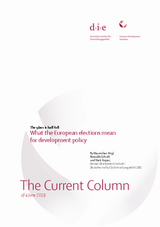The glass is half full
What the European elections mean for development policy
Högl, Maximilian / Benedikt Erforth / Niels KeijzerThe Current Column (2019)
Bonn: German Development Institute / Deutsches Institut für Entwicklungspolitik (DIE), (The Current Column of 4 June 2019)
Bonn, 4 June 2019. Europe has voted and it appears that the electorate headed to the ballot box was united above all by its diversity. The freshly elected European Parliament now has the Herculean task of simultaneously addressing its own fragmentation and the future challenges facing Europe. This will have an impact on how the Parliament operates in all policy areas, not least European development policy. The 2019 European elections did not lead to the wave of right-wing populism that many had feared they would. It is true that two parties from this spectrum became the strongest forces in Italy and France and that populist parties triumphed again in Poland, Hungary and the UK. At overall level, however, these parties did not fare better than expected. In fact, in many areas, they performed worse. The total proportion of seats held by right-wing populist and Eurosceptic parties in the European Parliament increased slightly from 21 per cent to 23 per cent. From refugee policy to the climate crisis This relatively moderate result is a good sign for the EU’s ability to take action on matters of global sustainable development. Nonetheless, it is to be expected that right-wing populists will increasingly push to chair committees and to take up rapporteur posts and that they will be highly intentional in using their newly acquired platforms on the European stage to influence public discourse. The past has shown, in regard to refugee policy for example, that other parties tend to co-opt right-wing populist positions that appear to be appealing to voters. However, the election result also gives some cause to hope that we will see the trend reverse, especially in Germany. While public discourse has been dominated in recent years by refugee policy, we are seeing signs that movements such as ‘Fridays for Future’ could change this. Climate policy has now become an election-deciding issue. In the aftermath of the elections, conservatives and social democrats in Germany have acknowledged that a lack of convincing answers to the challenges posed by the climate crisis was the main reason for their poor performance and announced their intention to rectify this. New dynamics in the Parliament? The last legislative period often saw the European Parliament pragmatically move from one proposal to the next without doing anything to help shape Europe’s long-term political orientation. One example of this in the development policy sector is the new European Consensus on Development from 2017, which aims to present a collective political vision of development policy at the leadership level of the Commission, the member states and the Parliament. However, as with other legislative projects, the Parliament decided to adopt the position of the European Commission instead of setting its own priorities. It is yet to be seen whether the new Parliament will actually create greater dynamism and more initiatives. It could make use of the key development policy decisions due to be taken in the next few months to actively shape policy. The main priority is to make further headway in ongoing negotiations over a single Neighbourhood, Development and International Cooperation Instrument with an anticipated budget of almost EUR 90 billion for the period from 2021 to 2027. Negotiations are also continuing on the new multiannual financial framework, the EU’s long-term budget plan, and could go on until late 2020, when Germany will hold the European Council presidency. Other key development policy issues include the EU’s future relationship with Africa (under the post-Cotonou negotiations) and the polarising topic of migration policy. Power shifts in the Committee on Development and the Committee on Foreign Affairs, traditionally dominated by conservatives (EPP) and social democrats (S&D), will play a key role in this context. There are several quite different conceivable positions, depending on which coalition prevails from which political group. A three-way coalition of conservatives, social democrats and liberals (ALDE), for instance, would most likely increase protection for the EU’s external borders, conclude more refugee agreements along the lines of the EU-Turkey deal and step up repatriations. Similarly, the EPP and ALDE are calling for financial assistance to be tied to the willingness of partner countries to take back migrants, a position rejected by the S&D and the European Greens. It is now time for the European Parliament to capitalise on the fresh relevance afforded to it by the European elections. In addition to punishing the major people’s parties for their business-as-usual approach, Europeans have also shown just how much importance they attach to climate policy and sustainable development. The European Parliament has an opportunity and a responsibility to restore Europe’s status as a normative power on the international stage.



